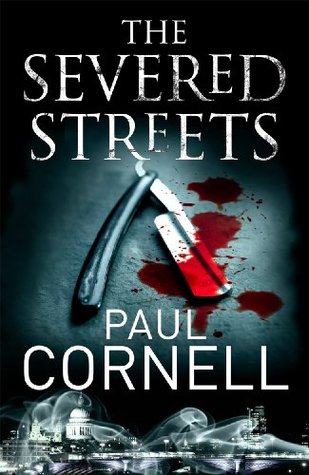The Severed Streets is the second book in a new series which began with London Falling. You could describe this series as a darker, grittier sibling to Ben Aaronovitch's Peter Grant novels: Paul Cornell's London is also full of magic, but bereft of humour and warmth.
Our four police officers who have been blessed / cursed with The Sight, which lets them perceive the supernatural, have just about recovered from the traumatic events of the previous novel. They work from their little portakabin and wait for a new case to arise which requires their expertise. Lo and behold, a LibDem MP gets brutally eviscerated in his locked limousine. There's no weapon in the car, the driver insists he didn't do it, and CCTV shows no one getting in or out...
Paul Cornell makes some interesting choices in the writing of this novel. For one, he instantly dates it by setting it during the Con-Dem-Nation coalition government. He creates thinly veiled replicas of real people and events: a media baron who is a thinly disguised Viscount Rothermere (called Russel Vincent in the novel), protests based on the London Riots but set in post-Olympic-Games-London, masks based on the V for Vendetta Guy Fawkes masks made popular by Anonymous, but consistently and irritatingly described as 'Toff masks'... but then real people also appear in his book. Frankie Boyle makes a cameo. Neil Gaiman makes an appearance that seemingly starts out as cameo and then develops into a full blown story arc. I thought it's more common for age-defining authors to get fictionalised posthumously (Shakespeare, Dickens, Austen etc.), so the appearance of Neil Gaiman was a bit of a surprise, and when he got involved in the plot, well, let's just say Paul Cornell had better be a good friend of Neil Gaiman...
There is something mischievous and a little transgressive about this aspect of the book, but also just a tiny bit frustrating. Paul Cornell's Neil Gaiman talks about similar sorts of things as the real one (stories, Neverwhere, bees), but he does not quite sound like real Neil, or perhaps the opposite - perhaps he sounded a bit too matter-of-fact and authentic, and I sort of expected something a little grander.
OK, Neil Gaiman out of the way, the Severed Streets is a grim dark, horror-filled urban fantasy. The Smiling Man continues to be behind things, and the attacker eviscerates quite a few people using the riots for cover (wearing a protester's mask, rising from crowds & flying off, invisible to those without The Sight), while two of our police officers are obsessed with their own problems - getting a father out of hell, and trying to avoid going to hell, respectively. There are some betrayals, some schemes, a lot of individual actions - basically, if our team finally learnt to work as a team in book one, they are now again working quite independently and with serious obstacles to fully trusting and sharing information with each other. They keep running off without telling any of the others what they're up to.
The book may spill more blood than the first, but is a less gruelling read: this time, no children get boiled alive, and while there's plenty castrations, the horror is less emotional than it was in London Falling. There's a lot of work in creating something uncanny, but it feels a little uncanny-by-the-numbers. If it's ever turned into a movie, I think Terry Gilliam should direct it.
The Severed Streets is an engrossing read, relentlessly grim, with a few emotional gut-punches, but none that equal those surprises that made the first book so harrowing towards its finale. The series is definitely worth a look for people who like urban fantasy, but not perhaps the series of choice if you're in the mood for something cheery and light. While The Severed Streets does explain and sum up some of the key events from the first book, I doubt it works very well as a standalone - start with London Falling if you have not read that yet.
Rating: 3.5/5


1 comment:
Huh. I'm curious about the Gaiman cameo now!
Post a Comment